- Home
- Cynthia Ozick
Critics, Monsters, Fanatics, and Other Literary Essays Page 6
Critics, Monsters, Fanatics, and Other Literary Essays Read online
Page 6
Outram’s offer to Vincent is dumbfounding—the chance to write the biography of the still living but elderly Jorris Buxton, the paramount figure of the age. Buxton’s background borders on the improbable: a professor of Greek, a poet, a painter, a novelist—all this before his fortieth year, following which, Outram explains, “he became a physicist. He engaged a tutor and in a year he had learned everything that a brilliant student learns in four years . . . everything he had learned seemed to be there inside him ready to be unfolded. That is, he was a genius. He went to M.I.T. and his doctoral thesis is still famous. . . . He took jobs in several of the great physical laboratories. He went to Europe and studied mathematics. . . . It’s the story of our time.” It is also implausibly conceived: science and math prodigies are generally known to manifest and pursue their gifts very early, proceeding in concentrated unipolar fashion. But what Trilling was after—to accommodate his plot and its anticipated climax—was some mammoth all-encompassing persona, a type of muscular masculinity steeped in lasting fame: he would have such a man turn imprudently wild in consequence of a reckless obsession with a young girl four decades his junior. Trilling’s real-life model, he informs us, was at first Walter Savage Landor, a nineteenth-century English poet “of heroic size,” similarly infatuated in old age. Yet Buxton as he develops (insofar as he is developed at all) is closer to an amalgam of William James, the scientist-adventurer, and Henry James, the closeted imaginer—on whom Trilling purposefully bestows a robust heterosexual lust. (Or so Professor Murphy acutely parses it.)
That Outram should choose an unseasoned twenty-three-year-old, evidently talented but lacking any literary standing, for this daunting biographical project—an interpretive likeness of a man “weighty with years, wisdom, power”—is a puzzle. It will not occur to Vincent until much later in the progress of the narrative to suspect Outram of a clandestine motive for so grand an anomaly, and the novel breaks off before any such motive is revealed. In the meantime, Vincent is catapulted into a sophisticated circle light years from his shabby midwestern origins. In the cultivated interiors and environs of Harold and May Outram’s home, situated “in a New England town of considerable tradition,” he is introduced to a series of half-explained persons, all deeply implicated with one another in ways not immediately apparent. The cumulative effect of these characters as they enter their respective scenes singly or in clusters is reminiscent of those familiar Hollywood whodunits where all the likely suspects, each with a reasonable alibi, are assembled for interrogation by a shrewdly knowing investigator. Vincent, however, is not shrewd; he is intelligent and alert, though still youthfully uncomprehending, and always tagged with variations of the epithets of incompleteness Trilling tirelessly attaches to him: “so immature and inexperienced,” “waiting for things to happen to him,” “like a foreigner in a new land,” “the various perils which beset the young man who gives himself to the life of the mind,” “with how many attempts to master its own inchoateness would this young mind of his move,” “he was a young man who thought much of fame, power, and success in life,” and on and on.
In this cloud of unknowing, the emphatically untried Vincent is made to confront a formidably bearded Jorris Buxton, an octogenarian who turns out to be frightened by a thunderstorm; his inscrutable assistant, Brooks Barrett; Garda Thorne, a middle-aged short story writer of some renown, who at seventeen was mistress to Buxton, then fifty-five (her name purloined from a novel by Constance Fenimore Woolson, a Henry James connection); Linda and Arthur Hollowell, a wealthy couple eager to buy a school to further their social views; Philip Dyas, the school’s headmaster, reluctant to sell; Marion Cathcart, the Outram children’s young caretaker, to whom Buxton appears attracted; and Claudine Post, whose infantilized teenage charge, Perdita, is described as being in a “not harmless” relation to Buxton.
It is a crowded gallery of carefully delineated portraits, whose innerness is divulged partly through dialogue but far more extensively in passages of cannily analyzed insight. And like pictures on a wall, it is all static—inevitably so, to begin with, since the problem of the story (every story implies a problem) is still undefined when the novel is cut short. Also, it should not be forgotten that the manuscript Professor Murphy unearthed was a draft in formation. The crucial proof of this middle-of-the-journey uncertainty is an appendix she has titled “Trilling’s Commentary,” yet another overview of the novelist’s intentions. There are self-admonitory reminders such as “the chapter should glitter more,” “make the likelihood of the choice of Vincent the greater and also the more acceptable,” and “what is making the difficulty is that I have not yet got a new point at which to aim.” Despite these strictures and doubts, Trilling’s narrative skill is now and then on bright display, especially in the earliest chapters touching on Vincent’s childhood and adolescent friendship with a boy whom Vincent will ultimately outgrow intellectually. Toss Dodge is the little boy who has just moved into the neighborhood:
Vincent stood on his part of the sidewalk and looked at the newcomer, who looked back and then turned his attention to the moving-men. Vincent kicked his way over to the curb and examined something at the edge of the road. He looked at it with a deep, rather amused curiosity. He touched it with the toe of his shoe. The object, whatever it was, engaged his attention as a Naturalist, a person to whom all things were significant. Actually he was examining nothing at all. But to justify his attention, he picked up a fallen seed-pod, peered at it a moment with a discerning eye, then threw it away. . . .
Meanwhile Toss had taken a position of responsibility near the van. He stood with his hands behind his back, supervising with quiet vigilance the operations of his men. He said nothing but he was sharp-sighted and a slight frown showed that he was not to be imposed on by his subordinates.
They were both now established in sufficient importance and could acknowledge each other.
Vincent said, “Hello,” carelessly, take it or leave it.
Toss answered in kind.
“You moving in?” said Vincent.
“Uh-huh. You live here?”
This is a mastery of boyhood worthy of Mark Twain. Nor was Trilling unaware of the intuitiveness through which it was consummated. “The first part,” he confirmed, “did grow into something. And it grew with a kind of unconsciousness. This unconsciousness was very beguiling and reassuring.” It will not often recur in the remainder of the narrative. Trilling’s habit of theorizing perceptiveness ordinarily overrides the Keatsian negative capability he so much reveres—that openness to the oarless vagaries of the mind he regularly invokes in the essays. Yet the beguiling and reassuring intervals did come. Sentence by sentence, in striking set pieces and in short breaths and long, the freed imagination at times felicitously crops up—a staccato phrase here, a winding image there: wild flowers peeping through monuments of sculptured topiary. One such specimen, visual and tactile, is Buxton’s beard:
It was the best kind of beard that a man can wear, it was short and firm and jutted forward. It gave a base to the head and did not mask the face. It suggested fortitude and the possibility of just anger. . . . No one had happened to mention to [Vincent] that Jorris Buxton wore a beard. Out of the haze of other people’s attitudes this immediate fact emerged with a happy, bristly reality.
But this happy, bristly reality, impulsively observed and weighed, is too soon dowsed by metaphysics. Trilling is almost never sufficiently free of the burden, or the constriction, of understanding a character too well—even before that character is moved into action or speech. What ought to have been vividly revelatory—the force of the great man’s spirit when at last he sits down with his biographer—is somehow deflected into humdrum brooding discursiveness. Its immediate ground is the intrusive presence of Buxton’s servile assistant, whose “striking repulsiveness” Buxton mutely erases through a kind of contemplative transcendence, sweeping Vincent into what purports to be sudden feeling:
Vincent tried to give words to the emotion he fe
lt. It was, he could say, the emotion of pure disinterestedness. . . . Vincent made use of the word “pure” because that word suggested the sensation of crystalline, translucent being that he had felt. He eventually hit upon another word, “peace,” remarking that what was probably meant by that word was a perfect poise of energies without the alloy of personality. He reminded himself that the ancient philosophers, when they spoke so passionately to recommend death, probably had these conditions in mind. They obviously could not mean non-existence. They must have meant an existence in perfect equilibrium of the impulses and powers with no element of that greed which they identified as the personality. This condition of being was sometimes permitted by life, but life was always presenting demands that brought the experience to an end. Hence, Vincent supposed, the recommendation of death.
Death, yes! Deadly prose, dead on the page. Where is Buxton in all this? Where, as a matter of fact, is Vincent, through whom these cerebrations course? The beard is written; the beard is alive; the beard is a character in a novel. But Buxton has vanished, and Vincent himself recedes behind the privet hedge of abstraction. The fault is not that Trilling’s recitation here deals solely with ideas, and not so much that it is repetitively clotted, and not even that it eschews drama. Thought as drama, the act of thinking as a vehicle of high excitement, is anyhow central to Trilling’s credo. Vincent’s story, the authorial preface points out, “is of a kind that will inevitably throw off ideas; and the characters are articulate, intelligent, and embody certain moralities.” Then why does the novel fail—fatally—in this crucial first encounter between its two supposedly articulate and intelligent major figures? Novels—great novels—are known to be studded with meditative insertions that not only do not produce longueurs, they leave behind traces of glory. Dostoyevsky’s Grand Inquisitor may be too heatedly elevated an instance; but think of James’s Isabel Archer, alone and motionless before the fire, sunk in rumination for twenty uninterrupted pages. The Portrait of a Lady can sustain this dialogueless island of inaction because it is preceded and followed by everything that a novel is and does to seduce us into feeling it is alive.
Trilling’s refusal—or his inability—to allow Buxton to speak at the very juncture it is most urgent for him to speak collapses what is to come. Or, rather, he does speak, he is said to speak, but we cannot hear him. It isn’t enough for Vincent to send out signals or symptoms of Buxton’s thought: “the eyes lived with the life of the contemplating mind . . . the eyes showed, or so Vincent felt, a life beyond the words that Buxton was speaking.” But this is dumbshow, a silent movie—where are the words? The snatches of Buxton’s talk scattered through the few remaining chapters are no more than mannerly clues on the style of “show them in,” “do sit down,” “a fine bunch of a girl,” and one or two meager remarks on Darwin. Vincent can insist, on one occasion or another, that “in whatever way Buxton judged what he saw, he certainly saw a great deal,” and still the reassurance will instantly wither. What Buxton sees we cannot see. What Buxton feels we cannot feel. Buxton has no voice and no movement. Buxton is dead; a wraith.
Perhaps Trilling knew it. He knew what his novel was made of. It would be wrong and unfair, even brutal, to say, as many have said, that he was too intelligent to succeed at fiction, which courts fancy more than reason. After all, he had the conditions and trappings of a novel; he had its language, masterly and penetrating; he had the novel’s shape and its emotional furnishings; he had the different tenors of his intellect, its analytic capacity and its deep historical wisdom. He had his spurts of beguilement. He had, in short, all the equipment for the engineering of a novel. Yet he must have felt, finally, that he also had a dead man on his hands. Worse, in the end he took himself to be a simulacrum of that man. At fifty-seven, long after he had abandoned what was to have been his second novel, he lamented in his journal, “Nothing has so filled me with shame and regret as what I have not done.” He had not become what he hoped to be: a novelist commanding, authentic, and recognized. Instead, he had turned into his own Teddy Kramer, that enervated effigy of “Jewish pride,” a creature of such scrupulous intellectual honesty that he could not bring the longed-for work to a satisfactory conclusion.
And why was it imperative to write novels? “In my time,” Outram, who gave up fiction for social influence, ruefully tells Vincent, “it was novel or nothing.” Outram speaks for Trilling: in his time, novel or nothing. Then was that resplendent body of literary and cultural essays, and the university, and the authority, and the fame, and ultimately the legend—was all that nothing?
The Lastingness of Saul Bellow
How easy it is, and plausible, to regard a collection of letters spanning youth and old age as an approximation of autobiography: the procession of denizens who inhabit a life, the bit players with their entrances and exits, the faithful chronology of incidents—all turn up reliably in either form, whether dated and posted or backward-looking. Yet autobiography, even when ostensibly steeped in candor, tends toward reconsideration—if not revisionary paperings-over, then late perspectives and second thoughts. Whereas letters (but here let us specify a writer’s letters) are appetite and urgency, unmediated seizures of impulse and desire torn from the fraught and living moment. And letters—sorted, indexed, bound—are themselves a paradox: hotly alive, they claim death as a requisite. Rare and anomalous is the publisher who would prefer the correspondence of the quick, however celebrated, to the letters of the dead: the death of a writer who answers his mail, especially one possessed of a powerful fame, lengthens and amplifies the body of work.
Even so, death disports with writers more cruelly than with the rest of humankind. The grave can hardly make more mute those who were voiceless when alive—dust to dust, muteness to muteness. But the silence that dogs the established writer’s noisy obituary, with its boisterous shock and busy regret, is more profound than any other. Oblivion comes more cuttingly to the writer whose presence has been felt, argued over, championed, disparaged—the writer who is seen to be what Lionel Trilling calls a Figure. Lionel Trilling? Consider: who at this hour (apart from some professorial specialist currying his “field”) is reading Mary McCarthy, James T. Farrell, John Berryman, Allan Bloom, Irving Howe, Alfred Kazin, Edmund Wilson, Anne Sexton, Alice Adams, Robert Lowell, Grace Paley, Owen Barfield, Stanley Elkin, Robert Penn Warren, Norman Mailer, Leslie Fiedler, R. P. Blackmur, Paul Goodman, Susan Sontag, Lillian Hellman, John Crowe Ransom, Stephen Spender, Daniel Fuchs, Hugh Kenner, Seymour Krim, J. F. Powers, Allen Ginsberg, Philip Rahv, Jack Richardson, John Auerbach, Harvey Swados—or Trilling himself? These names of the dead—a good number of them past luminaries, a few (Lillian Hellman, say) worthy of being forgotten—do not come randomly. They all have their fleeting turn in Saul Bellow’s letters, whether vituperatively, casually, or approvingly (though scarcely ever indifferently). It is safe to say that most are nowadays not much in demand either at your local library or on Amazon, and safer yet to surmise that many have little chance of outlasting even the first third of the twenty-first century; several have barely outlasted the twentieth. Nearly all have been overtaken by newer writers lately grown familiar, vernal aspirants who crowd the horizon with their addictive clamor.
And even as these contemporary importunings swamp our perception, what can already be clearly discerned rising from this swelling armada of the twice-buried is a single exemption: Bellow. Among all the literary tumults and public roilings of the recently Famous, he alone courts lastingness, he alone escapes eclipse. To state this so bluntly is not so much a declaration as it is an inquiry. Only see how speedily the grave works its mufflings and comedowns—Ginsberg, mum; Mailer, dumb as stone. In the tracings of unassailable art, high or low, they leave improbable spoor: the poet no poet but minstrel and mountebank, the would-be immortal novelist undone by the politicized harlequin he became. Gradually they decay into symptom and artifact—documents of a receding social history—while the vestigial rustlings surrounding their names testify to nothing more mem
orable than outdated literary tinsel.
But Bellow stays, and why? Language—the acclaimed style—cannot be the whole of it, though its energetic capaciousness captures and capsizes American English with an amplitude and verve not heard since Whitman, and never before in prose. The mandarin-poolroom link, elevated riffs married to street vernacular, has become Bellow’s signature, and attracts lovestruck imitators. Yet brilliant flourishes alone, even when embedded in galloping ambition, will not make a second Bellow. (A second Bellow? Not for a hundred years!) There is instead something else, beyond the heated braininess and lavish command of ideas: call it feeling. In this bountiful volume of letters, the writer’s last brief words, set down fourteen months before his death, should all at once break open the hidden-in-plain-sight code that reveals why Bellow stays:
[My parents] needed all the help they could get. They were forever asking, “What does the man say?” and I would translate for them into heavy-footed English. The old people were as ignorant of English as they were of Canadian French. We often stopped before a display of children’s shoes. My mother coveted for me a pair of patent-leather sandals with an elegantissimo strap. I finally got them—I rubbed them with butter to preserve the leather. This is when I was six or seven years old. . . . Amazing how it all boils down to a pair of patent-leather sandals.

 Antiquities
Antiquities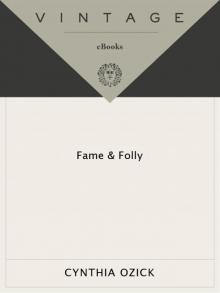 Fame & Folly
Fame & Folly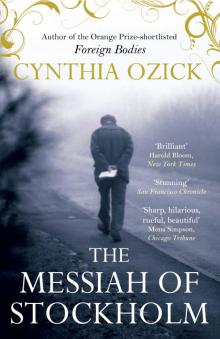 The Messiah of Stockholm
The Messiah of Stockholm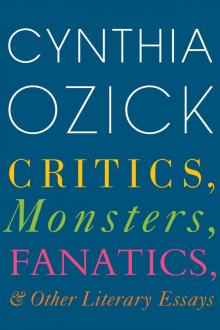 Critics, Monsters, Fanatics, and Other Literary Essays
Critics, Monsters, Fanatics, and Other Literary Essays Heir to the Glimmering World
Heir to the Glimmering World The Din in the Head
The Din in the Head Dictation
Dictation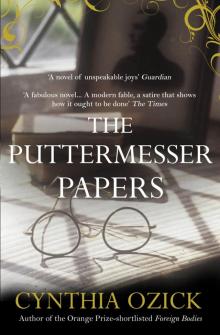 The Puttermesser Papers
The Puttermesser Papers Metaphor and Memory
Metaphor and Memory Art and Ardor
Art and Ardor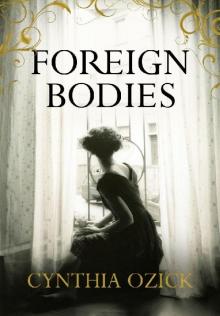 Foreign Bodies
Foreign Bodies Quarrel & Quandary
Quarrel & Quandary